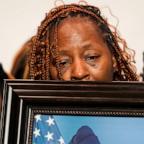VA Department Adapts to New Kinds of Battle Scars
Quarter of Iraq War Veterans Return With Mental Illness
July 17, 2007 — -- A suburban Virginia hotel replete with chandeliers, carefully arranged tables and air conditioning seems an unlikely place to discuss the harsh realities of war.
It is far from the roadside bombs, civilian deaths, baking desert temperatures and constant threat of attack U.S. troops face on the ground in Iraq and Afghanistan.
But it was in this comfortable setting that the Department of Veterans Affairs met Monday for a forum on the mental health of returning veterans.
"The wounds of war are not always the result of explosions and rocket fire. They can sometimes be unseen, and cloaked in silence," said VA Secretary Jim Nicholson, who announced his resignation Tuesday, just one day after the conference.
"Whether it's called soldier's heart … shell shock ... battle fatigue … or post traumatic stress disorder, the effects of the stress of combat demand and deserve our full and immediate attention," Nicholson, himself a decorated Vietnam Veteran, said.
Signs on either side of the podium read "Caring for the Whole Veteran" -- referring to mental and physical health -- and it was this message of bipartite coverage that was conveyed to the audience of mental health professionals and VA staff.
Nicholson emphasized his agency's flexibility in handling veteran's health care in the 21st century, pointing to a five-year plan to implement the VA's comprehensive Mental Health Strategic Plan.
Currently at the midpoint of its implementation, the plan calls for increasing the number of mental health workers (more than 9,000 are employed) and standardizing coverage in all facilities.
According to Nicholson, every VA facility now has the capacity to handle post traumatic stress disorder.
PTSD is caused by a severe traumatic even, and the VA recognizes the condition among those who have experienced symptoms for 30 days or more.
It is a treatable condition that afflicts "a significant minority" of returning veterans and is addressed with a combination of psychiatric medications and cognitive therapy, among other techniques.




